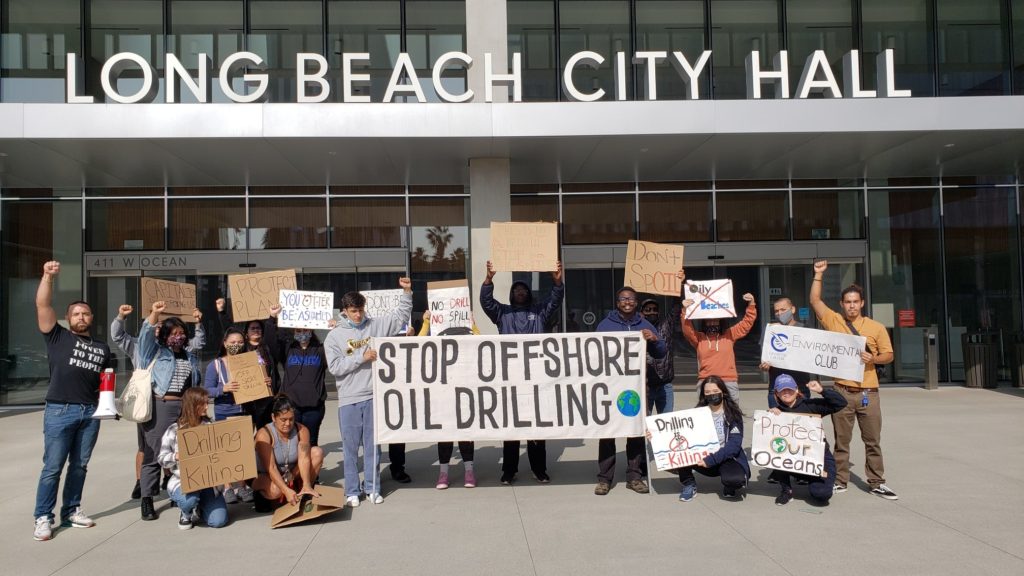PERSPECTIVE: End Offshore Drilling in Long Beach
7 minute readOn any given day in Long Beach, you’ll find people running, biking, rollerblading, or just sitting on the grass at Bluff Park, enjoying a meal, music, or simply the view of the Pacific Ocean. But hiding in plain view just a few hundred feet offshore are four oil rigs pulling crude from deep beneath the harbor and city.
These islands–known as the THUMS Islands–aim to deceive the public and hide the ugly industrial realities of oil extraction by creating a “tropical illusion,” which was the intended goal of the project when it was first being constructed in the ’60s.
The oil rigs, old and outdated, have cleverly been disguised with waving palm trees, waterfalls, and tall eye-catching buildings by the same designers who created Disney’s Tomorrowland. Folks go about their business exercising, eating, and breathing, all adjacent to this extractive capitalism that compromises air quality, perpetuates fossil fuel reliance, and risks the next oil spill.
The age of oil is over. It’s time for Long Beach to be a trailblazing city and immediately phase out offshore drilling.
Since the infamous Santa Barbara oil spill of 1969, where it’s estimated that up to 4.2 million gallons spilled into the water, there have been 44 other large spills nationwide—each spilling over 420,000 gallons of crude oil. The most tragic of such happened in 2010, when the British Petroleum offshore drilling rig Deepwater Horizon spilled an unconscionable 4.9 million gallons into the Gulf of Mexico. This catastrophe killed 11 workers, injured another 17, and further endangered critical marine species near extinction, all while costing the local economy billions of dollars.
Oil spills are inevitable as we have witnessed since the inception of offshore drilling. The most recent occurred off the coast of Huntington Beach in October when a pipeline that runs from an oil processing platform nine miles off the coast to a terminal in Long Beach ruptured. The spill sent 140,000 gallons of crude oil into the Catalina Channel, impacting the local economy, killing birds and fish, and severely damaging local wetlands that will take decades to recover. This was not Huntington Beach’s first oil spill either. The last one occurred in 1990, when 444,000 gallons gushed into the Pacific Ocean, killing fish and 3,400 birds.
While the City of Long Beach recently began exploring phasing out oil drilling by 2035, it’s important to note that this plan is not a response to climate change or public health; rather, it’s because the wells will no longer be “economically viable” in 13 years.
The artificial islands off the Long Beach coast are owned by the city but operated by California Resource Corporation (CRC). Between 2015 and 2018, CRC accumulated 228 state violations in Long Beach. THUMS alone was issued 103 violations for missing mechanical integrity tests and another 47 for failing tests. “Mechanical integrity tests” are required before injecting toxic chemicals underground to encourage oil extraction.
Currently, the city budget is dependent on revenue from the THUMS islands, which goes toward supporting the police and fire departments, lifeguards, beach maintenance, as well as funding capital projects in coastal communities such as the Naples seawalls, playgrounds, and the beach bike path. The city’s Tideland Funds, where money made from drilling in the harbor area is deposited, took in $8.6 million in oil profits in 2020.
Tomisin Oluwole
Ode to Pink II, 2020
Acrylic and marker on paper
14 x 22 inches
Click here to check out our interview with Tomisin Oluwole, a a literary and visual artist based in Long Beach.

Instead of gunking up our site with ads, we use this space to display and promote the work of local artists.
This reality begs the question: How can Long Beach claim to be a progressive city taking on climate change when its own operation is intimately tied to four offshore oil rigs that continue to drill in its harbor? Part of phasing out offshore drilling means reducing reliance not only on fossil fuels but city revenue from oil production. Allowing these rigs to continue operating locks us further onto fossil fuel reliance for decades to come.
In order to avoid the most catastrophic impacts from climate change, it is imperative to revolutionize our energy systems while transitioning from fossil fuels immediately. The Intergovernmental Panel on Climate Change (IPCC) has stated we have 10 to 12 years to prevent global temperatures from rising above 1.5º C (2.7ºF). If we reach 1.5º C, we risk “climate breakdown” or “runaway climate”—the point in which the physical processes of the planet that keep balance can no longer offset greenhouse gas emissions. If Long Beach claims to be a climate-friendly city, isn’t it unethical and hypocritical to continue to allow offshore drilling?
In addition to a runaway climate crisis, there are several other risks at hand. Offshore drilling threatens our local coastal economies and marine biodiversity while increasing the probability of human health impacts in our communities. While walking my dog or doing yoga at Bluff Park, I can taste the oil on my tongue. A rising headache develops from the smell, causing nausea and lightheadedness.
These risks, coupled with the climate crisis and our short time scale to avoid cataclysmic consequences, quite convincingly make the case that continuing offshore drilling is counterintuitive and jeopardizes the global community’s goal of keeping global warming from rising above 1.5 Cº.
The path forward for Long Beach requires a two-fold commitment. First, the city needs to immediately look into the process of phasing out offshore drilling. This entails reducing fossil fuel reliance and city revenue from oil production. Two, the city must continue to draft and implement plans to increase locality, increase walking ability, and increase multimodal transit.

To push this agenda forward, the Otter Coalition (Opportunities Towards Transformative Environmental and Economic Resilience) has held two rallies and marches with over 35 people attending. This organization, started by myself and others, is currently coalition building and starting a petition to end offshore drilling in Long Beach. Folks who are interested in joining our coalition can find us on Instagram @ottercoalition.
It is only a matter of time before the next tragedy. As Long Beach’s own (soon-to-be-retired) Rep. Alan Lowenthal has said: “Where there is drilling there is spilling.”
The time is now for Long Beach to be the progressive city it claims to be—end offshore drilling in Long Beach’s harbor and increase urban locality now. The two issues are inextricably linked. It’s time we challenge the fossil fuel industry’s greed and prioritize Mother Nature and public health.
Miles Aiello is a local climate activist and the founder of the Otter Coalition.


 maiello@ucsd.edu
maiello@ucsd.edu




